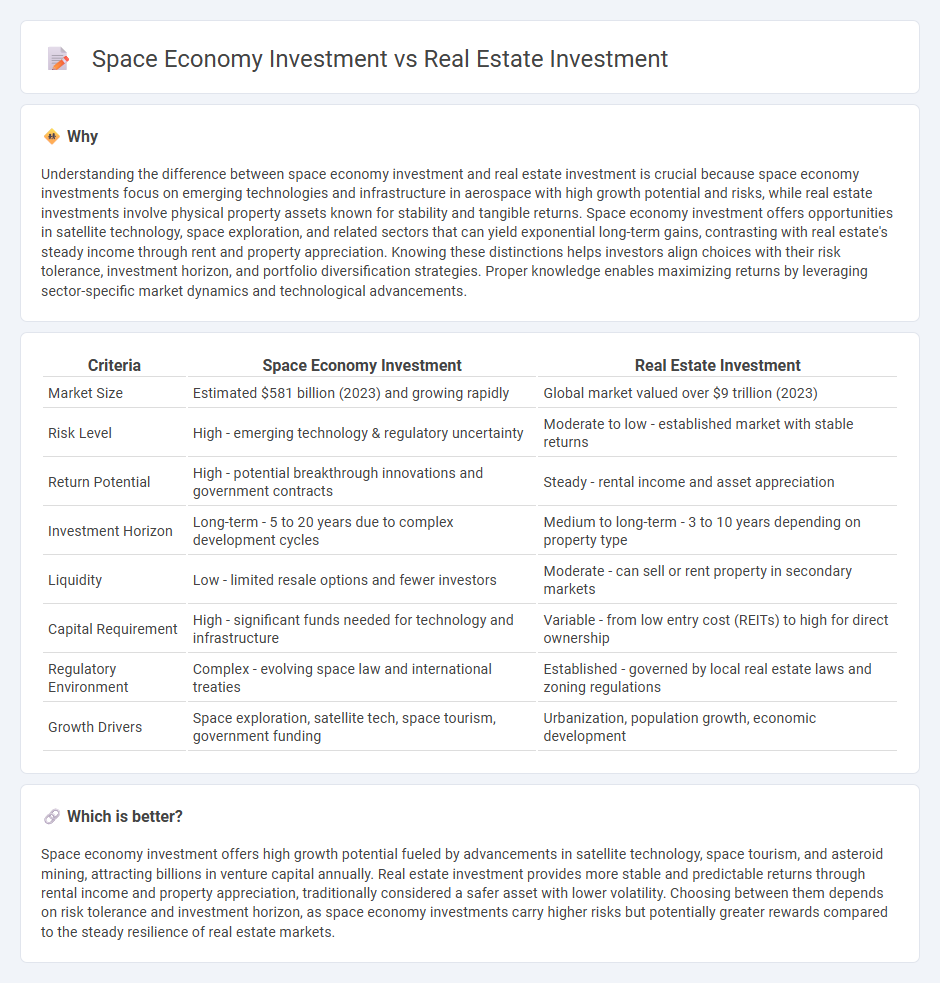
Investment in the space economy is rapidly gaining traction due to advancements in satellite technology, space tourism, and resource mining, offering high-growth opportunities and innovative market potential. In contrast, real estate investment remains a traditional asset class valued for its stability, predictable cash flow, and tangible property appreciation. Explore the unique benefits and risks of space economy investments compared to real estate to make informed financial decisions.
Why it is important
Understanding the difference between space economy investment and real estate investment is crucial because space economy investments focus on emerging technologies and infrastructure in aerospace with high growth potential and risks, while real estate investments involve physical property assets known for stability and tangible returns. Space economy investment offers opportunities in satellite technology, space exploration, and related sectors that can yield exponential long-term gains, contrasting with real estate's steady income through rent and property appreciation. Knowing these distinctions helps investors align choices with their risk tolerance, investment horizon, and portfolio diversification strategies. Proper knowledge enables maximizing returns by leveraging sector-specific market dynamics and technological advancements.
Comparison Table
| Criteria | Space Economy Investment | Real Estate Investment |
|---|---|---|
| Market Size | Estimated $581 billion (2023) and growing rapidly | Global market valued over $9 trillion (2023) |
| Risk Level | High - emerging technology & regulatory uncertainty | Moderate to low - established market with stable returns |
| Return Potential | High - potential breakthrough innovations and government contracts | Steady - rental income and asset appreciation |
| Investment Horizon | Long-term - 5 to 20 years due to complex development cycles | Medium to long-term - 3 to 10 years depending on property type |
| Liquidity | Low - limited resale options and fewer investors | Moderate - can sell or rent property in secondary markets |
| Capital Requirement | High - significant funds needed for technology and infrastructure | Variable - from low entry cost (REITs) to high for direct ownership |
| Regulatory Environment | Complex - evolving space law and international treaties | Established - governed by local real estate laws and zoning regulations |
| Growth Drivers | Space exploration, satellite tech, space tourism, government funding | Urbanization, population growth, economic development |
Which is better?
Space economy investment offers high growth potential fueled by advancements in satellite technology, space tourism, and asteroid mining, attracting billions in venture capital annually. Real estate investment provides more stable and predictable returns through rental income and property appreciation, traditionally considered a safer asset with lower volatility. Choosing between them depends on risk tolerance and investment horizon, as space economy investments carry higher risks but potentially greater rewards compared to the steady resilience of real estate markets.
Connection
Investment in the space economy drives technological innovations that boost satellite communication, GPS, and data analytics, which significantly enhance real estate market analysis and property management. Real estate investment benefits from space economy advancements through improved location intelligence, precision mapping, and risk assessment tools enabled by satellite data. The integration of space economy technologies creates new opportunities for smart urban development and more accurate property valuation in the real estate sector.
Key Terms
Asset Tangibility
Real estate investment offers tangible assets such as land and buildings, providing physical collateral and potential for long-term value appreciation. In contrast, space economy investment primarily involves intangible assets like satellite technology, data services, and intellectual property, often accompanied by higher technological risks but significant growth potential. Explore the distinct benefits and challenges of asset tangibility in these dynamic investment sectors to make informed decisions.
Market Volatility
Real estate investment typically offers lower market volatility due to tangible assets with stable demand, while space economy investments experience higher volatility influenced by technological advancements and regulatory shifts. The burgeoning space sector promises exponential growth but comes with significant risk factors compared to the relatively predictable real estate market. Explore these contrasting investment landscapes to make informed financial decisions.
Capital Intensity
Real estate investment typically involves moderate to high capital intensity due to the costs of land acquisition, construction, and ongoing property management. In contrast, space economy investment demands significantly higher capital intensity because of expensive technologies, research and development, and infrastructure required for satellite deployment or space exploration. Explore the unique financial dynamics between these sectors to better understand investment opportunities.
Source and External Links
Real Estate Investing: 5 Ways to Get Started - Offers five ways to start investing in real estate, including REITs, real estate investing platforms, rental properties, and flipping investment properties.
4 Ways to Invest in Real Estate - Provides methods to invest in real estate, such as purchasing a home, investing in REITs, and using mutual funds or ETFs.
Real Estate Investment Trusts (REITs) - Explains what REITs are and how they allow individuals to invest in income-producing real estate without directly owning properties.
 dowidth.com
dowidth.com